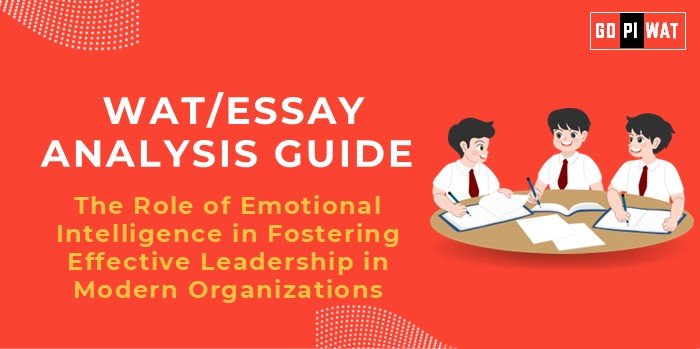📋 WAT/Essay Analysis Guide: The Role of Emotional Intelligence in Fostering Effective Leadership
🌐 Understanding the Topic’s Importance
Emotional Intelligence bridges the gap between traditional leadership and modern organizational needs. For B-school students, understanding EI is crucial to succeed in team projects, internships, and managerial roles.
🖋️ Effective Planning and Writing
- Time Allocation (30 minutes):
- Planning: 5 minutes
- Writing: 20 minutes
- Review: 5 minutes
- Preparation Tips:
- Use frameworks like SWOT and case studies (e.g., Google, Microsoft).
- Incorporate statistics, expert quotes, and global examples.
📜 Introduction Techniques for Essays
- Contrast Approach: “While technical expertise is necessary, leaders without emotional intelligence struggle to foster cohesive teams and manage crises.”
- Solution-Based Approach: “Modern leadership demands emotional intelligence to balance productivity, innovation, and employee well-being.”
📊 Structuring the Essay Body
- Paragraph 1: Achievements
- “Satya Nadella’s leadership highlights how empathy and self-awareness can transform an organization’s culture and performance.”
- Paragraph 2: Challenges with Comparative Analysis
- “Despite its proven impact, EI remains difficult to measure, and traditional leadership cultures often undervalue its importance.”
- Paragraph 3: Future Outlook
- “Integrating EI-focused programs into leadership training and B-school curricula will create empathetic, effective leaders.”
📄 Concluding Effectively
- Balanced Perspective: “Emotional Intelligence is the backbone of modern leadership, but it must be balanced with accountability to drive sustainable success.”
- Global Comparison: “From Microsoft’s cultural transformation to Nordic countries’ emphasis on emotional well-being, EI-driven leadership is the future.”
✍️ Sample Short Essays
Balanced Perspective:
Emotional Intelligence enables leaders to foster team collaboration and innovation. However, overreliance on EI without measurable outcomes can impede accountability.
Solution-Oriented:
Leadership training programs must prioritize EI to help managers navigate global challenges, manage diverse teams, and drive productivity.
Global Comparison:
While the Nordic model excels in emotional well-being, Asia’s hierarchical leadership styles often lag in leveraging Emotional Intelligence effectively.
🔑 Recommendations for Sustainable Progress
- Integrate EI assessments into recruitment and leadership training.
- Promote empathy-driven leadership practices through real-world case studies and expert mentorship.
✨ Conclusion
By mastering Emotional Intelligence, future leaders will be better equipped to build collaborative, adaptable, and high-performing organizations.


